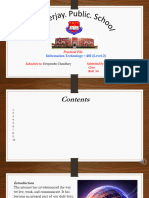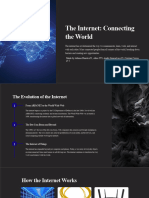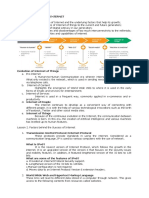**The Internet: Revolutionizing Communication, Knowledge, and Society**
The internet has become an integral part of modern life, transforming the way we communicate, access
information, and conduct daily activities. What began as a military project in the late 20th century has
grown into a global network that connects billions of people worldwide. Today, the internet serves as a
platform for communication, commerce, education, entertainment, and social interaction, reshaping
nearly every aspect of society.
One of the most significant ways the internet has impacted our lives is through communication. With
email, instant messaging, video calls, and social media platforms, people can connect with others across
the globe in real-time. Social media, in particular, has revolutionized the way individuals interact,
enabling them to share their thoughts, experiences, and ideas with vast audiences. The ease of
communication has led to the formation of global communities and allowed businesses to operate on an
international scale. Whether it’s a family video call or a professional Zoom meeting, the internet has
bridged the physical distances that once separated us.
In addition to transforming communication, the internet has revolutionized how we access and share
knowledge. Online education has grown exponentially, with students able to take courses from
prestigious universities and experts worldwide without leaving their homes. Digital libraries, academic
journals, and open-access resources have made information more accessible than ever before. The
internet has democratized learning, empowering people of all ages to acquire new skills and expand
their understanding of the world.
Moreover, the internet has drastically changed the way people shop, work, and do business. E-
commerce platforms like Amazon, eBay, and Etsy allow consumers to buy and sell goods from
anywhere, anytime, while digital payment systems like PayPal have made financial transactions more
convenient. The rise of remote work, facilitated by cloud-based tools and video conferencing, has
redefined the traditional office environment, offering flexibility and new career opportunities.
Additionally, the gig economy has flourished, with platforms like Uber, Airbnb, and Fiverr connecting
freelancers and service providers with customers on a global scale.
However, while the internet has brought about numerous benefits, it also presents significant
challenges. Privacy concerns, cybercrime, and the spread of misinformation are just a few of the issues
that have emerged in the digital age. The constant flow of information online makes it difficult to discern
what is true, leading to misinformation and fake news that can have real-world consequences.
�Additionally, the internet’s pervasive nature has raised concerns about data security, with personal
information often being exploited by hackers or companies for commercial gain. As our lives become
increasingly digital, it is crucial to strike a balance between technological advancement and responsible
usage.
The internet has undoubtedly revolutionized the way we live, offering countless opportunities for
communication, education, and business. At the same time, it presents new challenges that require
ongoing attention and regulation. As technology continues to evolve, the internet’s role in shaping
society will only grow, making it more important than ever to understand its impact and navigate it
thoughtfully. The future of the internet is boundless, and it will continue to play a central role in shaping
the world for generations to come.
























































































